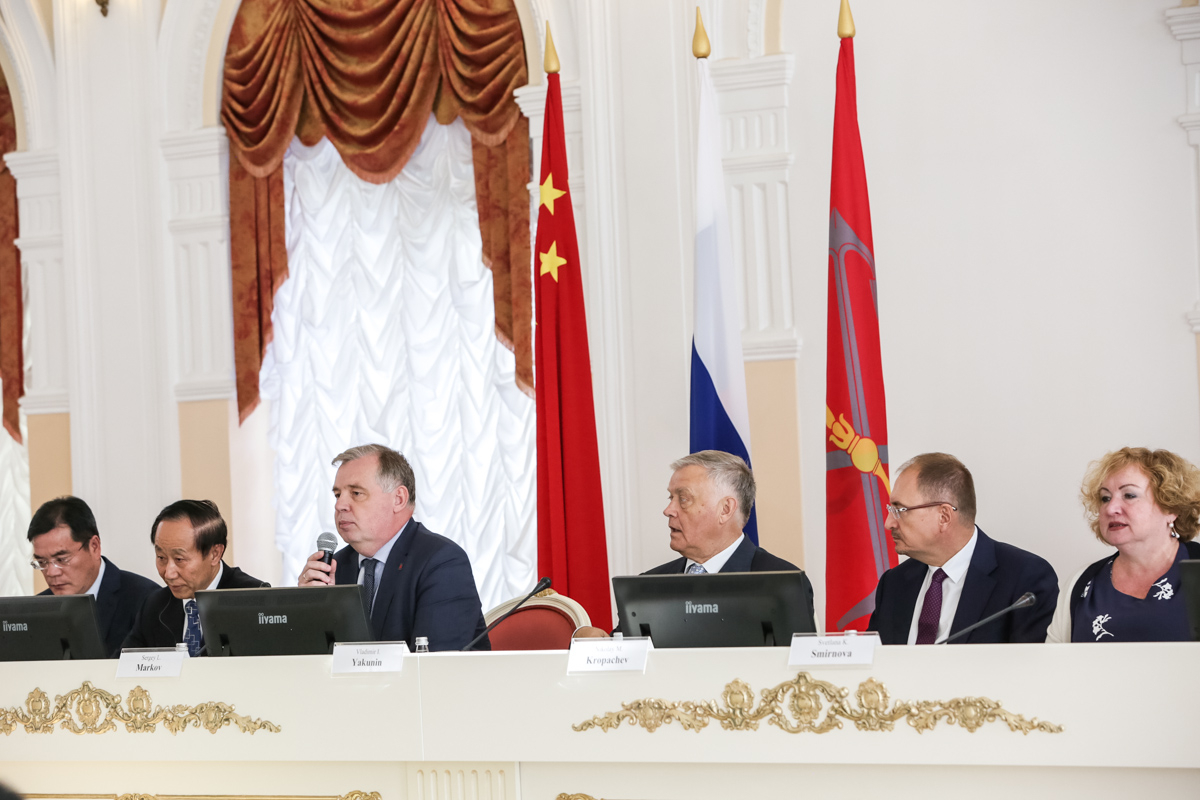Eurasian Partnership Issues have been Discussed at the First Geocultural Forum

The premises of the St Petersburg Administration and the halls of St Petersburg University seated the forum «New Aspects for Intercultural Dialogue: "The Belt and Road Initiative" and Greater Eurasian Partnership». As part of round tables, the participants examined the issues of interaction of the Eurasian countries in the fields of economics, politics, education and culture. One of the organisers of the forum was St Petersburg University.
Opening the forum, the governor of St Petersburg Georgy Poltavchenko noted that St Petersburg, the city on the Neva River, despite its geographical distance, is of great importance as a centre of interaction between Russia and China. Last year, the total trade turnover between St Petersburg and the People’s Republic of China amounted to six billion dollars, which is only a few percent less than all the Far Eastern regions taken together. A quarter of all Chinese students arriving in Russia to study in our country get an education in St Petersburg. «It can be said without exaggeration that St Petersburg is the main integration link in the relations between Russia and the People’s Republic of China. Mutual respect and trust are the basis for expanding our international dialogue and strengthening partnerships. The solid foundation of cooperation between our countries was laid during the Soviet-Chinese friendship, today we have become even closer to each other,» said Georgy Poltavchenko. He added that at present relations between Russia and China have reached a new qualitative level and invited forum participants to put forward their initiatives to further strengthen the interaction among the authorities of St Petersburg and the regions of the People’s Republic of China.
At the plenary meeting, Mr. Wang Jiarui, the President of the China Soong Ching Lingen Foundation, delivered a report. He noted that more than 2,000 years ago, the world-famous Land and Maritime Silk Roads were laid through Eurasia. Thanks to this, the countries involved in trade were able not to only exchange goods and technologies, but also conduct a dialogue of cultures. «In 2013, Chinese President Xi Jinping came forward with an initiative to build a joint economic belt of the Silk Road of the 21st century. Over the past five years, the initiative "One Belt and One Road" has moved from a glance into perspective to a real embodiment, and its basic concepts have been included in the final documents of international organisations such as the United Nations, G20, Asia-Pacific Economic Cooperation (APEC) and the Shanghai Cooperation Organisation,» said Mr. Wang Jiarui.
«Cultural diversity is an important factor stimulating the further development of world civilisations. Although the ancient Silk Road began with trade, its significance went far beyond the limits of commodity exchange: it became a corridor of communication for world civilisations», — mr. Wang Jiarui, the President of the China Soong Ching Ling Foundation.
At present, 34 educational programmes with a Chinese component in the areas of law, economics, and management with advanced studies in the Chinese language are being successfully implemented at St Petersburg University. Their implementation has become possible through a direct agreement signed by St Petersburg University with the Ministry of Education of China.
The Rector of St Petersburg University Professor, Nikolay Kropachev, thanked the city administration for supporting the Geocultural Forum and stressed that St Petersburg is not only the cultural capital of Russia, but also the main centre of Chinese studies of Russia. He noted that, speaking of cultural exchange, one should also remember about geography. «In my opinion, the ideologists of the theory of geopolitics have prematurely declared the total unification of our world in the era of the onset of globalisation. They might have underestimated the deep meaning of culture, which is at the heart of all political decisions and processes. We should respect the cultural identity of our neighbours across the continent, but to do this it is necessary to learn to understand distinctive features of their culture and history,» said Nikolay Kropachev. «Universities and research institutions with unique intellectual potential, being centres of attraction for scientists and students from all over the world, should play a special role in this process.» The Rector of St Petersburg University noted that science has no boundaries, and education is becoming truly international. So, only five years ago about 400 Chinese students studied at the University, today this number exceeds 1,200 people. Every year, more than 5,000 experts from all over the world come to St Petersburg University, and almost every sixth of them is a citizen of the PRC. Thus, the University enriches its intellectual potential through cultural interaction.
Nikolay Kropachev also spoke about his meeting with a group of famous Russian writers whose works had been included in the Almanac of Modern Russian Prose, which, being translated into Chinese, was printed by one of the best publishers in the PRC in an edition of 2,000 copies.
Concluding his speech, the Rector of St Petersburg University noted that it is culture that is the main engine of development of countries and peoples, and consolidation of creative forces at the Geocultural Forum will contribute to improving the political climate on the Eurasian continent.

